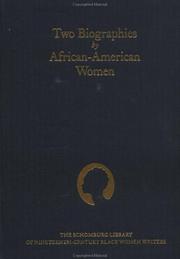| Listing 1 - 3 of 3 |
Sort by
|

ISBN: 0195062043 Year: 1991 Publisher: Oxford [etc.] : Oxford University Press,
Abstract | Keywords | Export | Availability | Bookmark
 Loading...
Loading...Choose an application
- Reference Manager
- EndNote
- RefWorks (Direct export to RefWorks)
African Americans --- Fugitive slaves --- Brown, William Wells, --- Delany, Martin Robison, --- Delany, M. R. --- Brown, W. W. --- Brown, W. Wells --- Brown, Wm. Wells --- United States. --- Freedmen's Bureau --- United States --- History --- Participation, African American. --- AFRO-AMERICANS --- BIOGRAPHY --- DELANY (MARTIN R.)
Book
ISBN: 0231540582 9780231540582 9780231174428 023117442X 023117442X Year: 2016 Publisher: New York Columbia University Press
Abstract | Keywords | Export | Availability | Bookmark
 Loading...
Loading...Choose an application
- Reference Manager
- EndNote
- RefWorks (Direct export to RefWorks)
William Wells Brown (1814–1884) was a vocal abolitionist, a frequent antagonist of Frederick Douglass, and the author of Clotel, the first known novel by an African American. He was also an extensive plagiarist, copying at least 87,000 words from close to 300 texts. In this critical study of Brown's work and legacy, Geoffrey Sanborn offers a novel reading of the writer's plagiarism, arguing the act was a means of capitalizing on the energies of mass-cultural entertainments popularized by showmen such as P. T. Barnum. By creating the textual equivalent of a variety show, Brown animated antislavery discourse and evoked the prospect of a pleasurably integrated world.Brown's key dramatic protagonists were the "spirit of capitalization"—the unscrupulous double of Max Weber's spirit of capitalism—and the "beautiful slave girl," a light-skinned African American woman on the verge of sale and rape. Brown's unsettling portrayal of these figures unfolded within a riotous patchwork of second-hand texts, upset convention, and provoked the imagination. Could a slippery upstart lay the groundwork for a genuinely interracial society? Could the fetishized image of a not-yet-sold woman hold open the possibility of other destinies? Sanborn's analysis of pastiche and plagiarism adds new depth to the study of nineteenth-century culture and the history of African American literature, suggesting modes of African American writing that extend beyond narratives of necessity and purpose, characterized by the works of Frederick Douglass and others.
Plagiarism --- American literature --- Abolitionists --- Authorship --- Copyright infringement --- Literary ethics --- Literature --- Quotation --- Torts --- Imitation in literature --- Originality in literature --- History --- African American authors --- History and criticism. --- Brown, William Wells, --- Brown, W. W. --- Brown, W. Wells --- Brown, Wm. Wells --- Criticism and interpretation. --- Brown, William Wells --- Criticism and interpretation --- History and criticism --- United States --- 19th century
Book
ISBN: 1107589983 1108075622 Year: 2014 Publisher: Cambridge : Cambridge University Press,
Abstract | Keywords | Export | Availability | Bookmark
 Loading...
Loading...Choose an application
- Reference Manager
- EndNote
- RefWorks (Direct export to RefWorks)
William Wells Brown (1814?-84) was uncertain of his own birthday because he was born a slave, near Lexington, Kentucky. He managed to escape to Ohio, a free state, in 1834. Obtaining work on steamboats, he assisted many other slaves to escape across Lake Erie to Canada. In 1849, having achieved prominence in the American anti-slavery movement, he left for Europe, both to lecture against slavery and also to gain an education for his daughters. He stayed in Europe until 1854, since the Fugitive Slave Act of 1850 had made it possible that he could be taken back into slavery if he returned. Meanwhile, he had begun to write both fiction and non-fiction, and this account of his travels in Europe, prefaced by a short biography, was published in 1852. Brown was able to return to the United States in 1854, when British friends paid for his freedom.
African Americans --- Slaves' writings, American. --- Fugitive slaves --- Travel --- Brown, William Wells, --- Great Britain --- France --- Description and travel. --- Runaway slaves --- Slavery --- Slaves --- American slaves' writings --- American literature --- Brown, W. W. --- Brown, W. Wells --- Brown, Wm. Wells --- Description and travel --- Enslaved persons --- American enslaved persons' writings --- Slaves' writings, American --- Enslaved persons' writings, American.
| Listing 1 - 3 of 3 |
Sort by
|

 Search
Search Feedback
Feedback About UniCat
About UniCat  Help
Help News
News